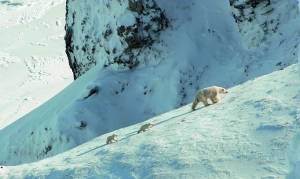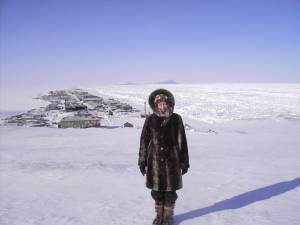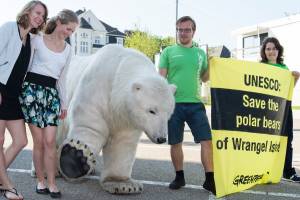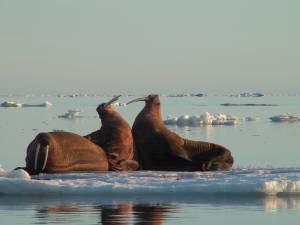This summer, 350.org team in Eastern Europe, Caucasus and Central Asia region (EECCA) organised a blogpost contest to get peoples’ impressions on the climate crisis and encourage discussion on the topic. The top three posts have been translated into English and will be published here. The first one is about Chukotka – one of the remotest places of Siberia. Its author, jornalist Maria Favorskaya, explores the effect of the oil industry and climate change on the fragile nature of the region and its native peoples.
- Maria Favorskaya:
In many people’s perception, Chukotka is at the end of the world, a frozen land of whales and polar bears. And of people far from the civilization and close to the Northern wilderness. But recent years have changed everything: the ice is retreating, while the oil companies are on the advance.
There remains less and less nature even at the world’s end. Who would have thought even a few years ago that Wrangel Island off the coast of Chukotka – perhaps the northernmost and remotest Russian national reserve – would end up at the center of the oil industry?
We went to Chukotka to learn firsthand what is going on there, by asking the indigenous inhabitants who see the world in their way and have a sophisticated feel for changes in nature. They told us what they are most worried about: the disappearing ice, the clash of civilizations and, certainly, oil.
The ice
The Chukotka locals do not need research papers on climate change. Every day, they observe the retreat of the ice and have already begin to sense its sad consequences. And if we find warmer winters gratifying, for these people they are a daily tragedy: walruses die, the reindeer starve, hungry bears invade villages…
Eduard Zdor of the Traditional Hunters Association says: “In the summer, the sea ice retreats further and further away from the Chukotka coast, it’s not around for as long as half a year now. And the ice is vital to sea animals: as a place for rest, for rookery, for breeding. In the mid 2000s, the ice was scarce to the point of disaster, and so many walruses died because of this!”
Elena Tevlyankau from the National Culture of the Peoples of the North Department in Anadyr: “We could somehow adapt to the changes in nature previously; today this is impossible. Last November was extremely warm, and ice glaze was all around, we had never seen that in Chukotka before. There is too little snow in the tundra, and it’s a hard time for the reindeer herders. When reindeer walk on uncovered ice, they hurt their hooves. Finding food gets all the more difficult for them“.
Ivilina Nomylina, a lawyer from Anadyr: “In my home village of Nezhka, the nature has remained largely untouched. What really makes us suffer is that it gets warmer. The walrus is nearly gone, the seals are fewer, even without industrial intervention. Polar bears lack food and enter villages more often.
“Polar Bear Island”
Wrangel Island off the Chukotka coast is unique both for the locals and for the entire world – it is a world natural heritage object. Its indigenous name, “Umkilir”, means literally “the polar bears’ island”. For the locals, this is the “ark” of the animal world, because its relatively small territory hosts all of the animals the North is proud of.
But even this haven has been reached by the irresponsible civilization. The construction of a military base is underway. At the same time, Rosneft and Gazprom have literally carved up the East Siberian Sea and the Chukchi Sea: the areas they have leased for drilling are comparable to the size of a smaller European country. Rosneft was in such a hurry to bite as much as it could that it severed a few patches in the protected area of the Wrangel Island Natural Reserve in violation of all laws. And as quickly as last autumn Rosneft survey ships surfed the protected waters, fending off the whales
Many scientists believe that polar bears are doomed in some 10 to 20 years, due to the oil drilling and climate change.
Eduard Zdor: “There’s constantly less ice at sea, this is why the significance of the island is huge both for walruses and for polar bears. Because, if there’s only open sea around, they have to swim hundreds of kilometres without rest until they are completely exhausted.
Everyone agrees that Wrangel Island is the polar bears’ maternity ward: it houses some 200 to 250 maternity dens. Oil drilling here is roughly equivalent to allowing workers in greasy overalls into a birthing room. Noise, dirt… I don’t know how many miscarriages the females will have. Any advance on Wrangel Island is a crime.”

“Wrangel Island is the polar bears’ maternity ward. Oil drilling here is roughly equivalent to allowing workers in greasy overalls into a birthing room. Photo courtesy of A. Bezrukov
The Clash of Civilizations
The Soviet culture treated the locals arrogantly, putting its own perceived “civilization” and their “savagery” into opposition. This is why the indigenous people get really offended by the “chukcha jokes”. But Soviet civilization and its followers today, the oil state-run corporations, have inflicted so much destruction that it is about time to wonder: is this really progress? Today, the people of Chukotka are trying to preserve what is left and rebuild bit by bit their traditions, thanks to which they have lived in peace with nature for millennia.
Elena Tevlyankau: “All our songs, dances, lore rest upon the relationship between humans and nature. But the colonizers have always taken us for people that know nothing and can do nothing. Our parents kept quiet and obedient, and our nation was crushed. Civilization is good, but it must not crush another civilization. The people who came here are different from us, they have different values. They are all here ‘for a while.’ And that shows itself, no matter what they say.”

Viktoriya Golbtseva, the conservator of the Chukhi language: my mom worked all her life in a bone-carving workshop where she engraved walrus tusks.
Viktoriya Golbtseva: “I know that our ancestors were the true environmentalists. They took care of the land, the air, the lakes and the rivers. Villages were always clean and built to a plan: at a distance from one another, so that everyone had enough resources. There was no stealing or poaching.
My personal mission is to preserve the mother tongue and culture of the coastal Chukchi. Our family traces its ancestry back to the seventh, eighth generation; we have found relatives in Alaska. My mom worked all her life in a bone-carving workshop where she engraved walrus tusks”.
Oil
If the warmer climate is a daily tragedy for the indigenous people, the oilmen do not shy away from their cynical joy: the ice is retreating, and that means new spaces for drilling.
It is cynical because the oil exploration of the Arctic is precisely one of a dozen of mega-projects approaching the no-return point that will make the climate change irreversible. And it will be not the oilmen who will suffer the consequences of the sea pollution. They prefer comfortable urban living (yes, they are indeed “for a while”, pumping the oil out before disappearing for good). It will be the coastal villages.
Elena Tevlyankau: “The coastal people live off what is given by the sea. But the quality of the catch is deteriorating. Last year we were out catching fish. They were swollen, with cyanotic spots. The whale was always THE animal to us. It was hunted, but it was also preserved. Catching a good whale today is impossible: the meat has a weird chemical smell and taste“.
Ivilina Nomylina: “Any intervention in the Northern nature is dangerous. Everyone knows it is too fragile. If an ATV crosses the tundra, the track remains for 50 years. Where fuel barrels were dropped in the 1970s, the water is still covered with an oily film.
The oilmen take no notice of the locals’ opinion, in the old Soviet style. They do not even think it necessary to explain their plans. The locals have to do all kinds of things short of stealing their ‘secret’ documents to understand what is being constructed next to their settlements.”
Viktoriya Golbtseva, Chukchi language supporters NGO “Mother Tongue” [“Rodnoye slovo”]. “Oilmen have now come to our seas for the first time. The unknown is scary: there are people and vessels, tests are underway, as well as a seismic surveys. Nobody is bothering to explain what this is, and what it is for”.
Elena Tevlyankau: “The coastal population don’t take part in any public hearings: the connection is poor, no Internet access, traveling is hard, and the industry makes no effort to communicate with them.”
Eduard Zdor: “We are very worried about the exploration of the sea shelf, first of all, the Rosneft’s plans. A similar disaster in the Gulf of Mexico occurred under rather calm conditions, in a warm sea. Ours is so much more of a difficult situation: the ice, the storms. If something comparable happens here, nothing can be repaired. Marine fishing will then be over for our peoples for many years. The animals won’t survive in the oil-contaminated water.
The oil companies were absolutely uncommunicative when they arrived here a few years ago. They didn’t notice our very existence and didn’t find it necessary to even speak to us, let alone consult. We had to fight our way to the Rosneft public hearings, stop short of stealing papers in order to just understand what the company will be doing in the Chukotka Sea. It has hardly got any better now. The oilmen abide by the law formally but it is still beyond our capability to influence them.”
Perhaps many people in Moscow believe that the new oil fields in the Arctic shelf are progress itself, millions of barrels of the greasy “black gold”, new constructions, the conquest of the North… At the same time, hardly anyone believes in the environmental responsibility of this business. Meaning, they silently agree that the progress requires sacrifice: the whole “ark of Northern nature”, and the local civilization on top of that. But what does it lead to apart from a more powerful resource curse and a closer point of no return?
The original text was published at Greenpeace Russia website

